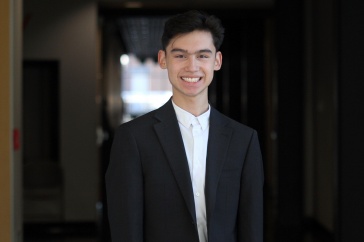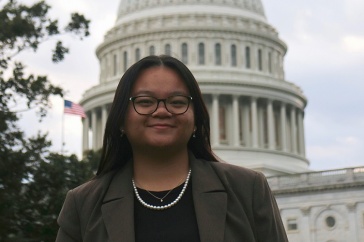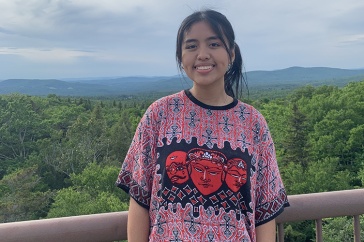
The first time Katerina Messologitis ’15 went to Costa Rica, in 2012, it was to learn about sustainable energy — wind, water, geothermal, solar.
The second time, she served as a mentor with the Green Program, a study abroad organization whose sole focus in renewable energy had led her there the year before.
In the summer of 2014, armed with her passion and all she’d learned, the environmental engineering major went to Africa to begin work on her senior capstone project: helping to build a photovoltaic energy source for a school in Ghana.
Messologitis, who serves as the project manager, pulled together a team of fellow seniors she knew would be as excited about the idea as she was. They designed a solar panel system, including the number of panels and batteries, the size of the inverter, and subsequent components, then traveled to Ghana to find a local company to build it.
“Our design was based on assumptions,” Messologitis says. “We’ve got a school with no electricity. There’s a huge energy crisis. Blackouts occur often and can last between three hours to a week.”
The goal was to create a system that would be able to power lights and fans at the school so it could be used after hours as a place for students to study and for the community to gather.
In Accra, Ghana’s capital, they found seven renewable energy companies, interviewed four, and decided on the one to do the work. Atlas Business Energy System (ABES) was chosen after they had reviewed the teams’ design and provided feedback on how it could best work.
The job now, Messologitis says, is to educate the community.
“It’s not just about supplying lights and fans,” she says. In January 2016, the group will return to Ghana and, working with ABES, hold training sessions for the community on how to install and maintain the solar panels.
|
Katerina Messologitis with UNH environmental engineering graduate student Zack Angelini and Ghanaian school children. Courtesy photo |
Next fall, Messologitis will be back at UNH pursuing a master’s degree in civil engineering with an environmental focus. She will spend the second semester in Holland, conducting research at PWN Technologies, a company known for its innovation in sustainable solutions in water treatment. Jim Malley, UNH professor of civil and environmental engineering, has a history with the Dutch company that has, for the past seven years, had a UNH student doing data collection there.
“I’m inspired by the best people,” Messologitis, naming Malley as one of them. She cites something he told his class. “He said, ‘When I was your age I set a goal to provide drinking water to 2 billion people.’ He’s at 1 billion-something.”
Another inspiration: Nancy Kinner, also a UNH professor of civil and environmental engineering. “She has so much passion for what she does; she loves her job. She said that engineers fix things and that’s my instinct, to go in and do it.
“I also have a reputation of taking on a lot,” Messologitis says. “I got interested in environmental engineering because of drinking water. Clean drinking water is one of the biggest issues in the world. Right now, my focus is sustainable energy in Ghana, but next year, I’ll be shifting gears.”
Gears: She’s got many. During her time at UNH she has been involved with research on water quality, UV treatments, pharmaceuticals and daily care products in wastewater, alternative energy and projects at the UNH Organic Dairy.
“I love doing research. I’ll never stop,” Messologitis says. “It’s just too fascinating. There’s always something new to learn in the world and I don’t want to miss it.”
-
Written By:
Jody Record ’95 | Communications and Public Affairs | jody.record@unh.edu


















































